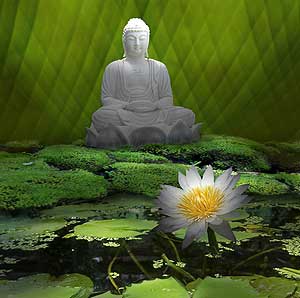By Janaka Perera, Asian Tribune, September 19, 2009
Colombo, Sri Lanka -- After six years, the largely negative attitude among many Sri Lankan Buddhists towards temporary ordination has undergone a welcome change. The credit for this achievement goes to the Buddhist Cultural Centre (BCC) Nedimala, Dehiwala, which arranged for lay Buddhists to become monks and nuns temporarily in 2003.
 The scheme has become highly successful attracting many young Buddhists to the BCC -run Dekanduwala Meditation Centre, Kahatapitiya, and Kananwila in Horana. The temporary ordination has been limited to a period of 14 days to make it easier for those doing jobs to obtain leave for the purpose.
The scheme has become highly successful attracting many young Buddhists to the BCC -run Dekanduwala Meditation Centre, Kahatapitiya, and Kananwila in Horana. The temporary ordination has been limited to a period of 14 days to make it easier for those doing jobs to obtain leave for the purpose.
Although this is still relatively new here it has a long history in other Theravada Buddhist countries such as Myanmar, Thailand, Laos and Cambodia as well as among the large Buddhist communities in Singapore and Malaysia. Among the well-known personalities who entered the Buddhist order temporarily in their younger days is Thailand’s King Bhumibol.
The first batch recruited under the scheme in Sri Lanka on January 15, 2003 included persons from different social strata and professions – some married others single. The educational levels of those who were temporarily ordained ranged from grade 8 to university graduates and post-graduates. Among them were medical students, engineering and management students and persons already employed. There were even those addicted to liquor, smoking and other vices and never attended a Dhamma school.
All persons thus ordained came from many parts of Sri Lanka, including Galle, Kandy, Polonnaruwa, Mahiyangana, Tissamaharama, Avissawella, Matale,Kekirawa, Panadura, Homagama, Padukka, Kadawatha, Moratuwa and Mount Lavinia.
The Dekanduwala Meditation Centre is so far the only institution in Sri Lanka giving such training to people who wish to become temporary bhikkus. This has absolutely nothing to do with those who become monks to obtain funds from lay Buddhists for doing high studies and entering politics to enjoy material comforts and power – sometimes by giving up the yellow robe.
BCC Director, the Venerable Kirama Wimalajothi told the Asian Tribune, “In becoming a true Buddhist what matters for both the clergy and the laity is not the number of university degrees they may obtain or their professional achievements or their politics but understanding the Dhamma and leading their lives accordingly.”
This was the reason for not making any distinctions when allowing people to enter the order of bhikkus temporarily. It was the same during the Buddha’s time. However during the period of temporary ordination the recruits are also given leadership and training in social services management and administration and how to lead exemplary lives as lay persons after the period of temporary ordination ends. Their daily programme at the meditation centre commences at 5.00 a.m. and ends at 10.00 p.m.
People who had been victims of all kinds of vices at the time they were ordained under this scheme had firmly resolved to give up all such wrong habits by the time they went back to their homes after two weeks of meditation and spiritual training, according to the Venerable Wimalajothi. He says that the scheme was launched with the objective of giving Sri Lankan Buddhists a proper understanding of their ancestral faith and building a disciplined society that upholds moral values.
Ven. Wimalajothi is a pupil of the late Venerable Dr. Kirama Dhammananda, the Sri Lankan-born Chief Sanghanayake of Malaysia and Singapore who helped to revive Buddhism in Singapore and Malaysia mainly among the ethnic Chinese community. During a visit to Sri Lanka in 2003 said that the temporary ordination was long overdue in Sri Lanka considering the fact that where he was resident such a scheme was introduced 25 years before to arrest social and moral deterioration.
Among the BCC’s other services are (1) Collecting copies of Buddhist books published all over the world and making them available to the pubic through the centre (2) Re-printing rare old Buddhist publications (3) Translating into English, Buddhist books written in Sinhala (4) Reprinting the series of the Buddha Jayanthi Tripitaka publications (5) Translating in 13 volumes the Sutra Pitaka (6) disseminating Buddhist information worldwide through the BCC website www.buddhistcc.com since 1996 and (7) Free distribution of 20,000 Buddhist books in 1999 to be kept available for foreigners at tourist hotels.

No comments:
Post a Comment